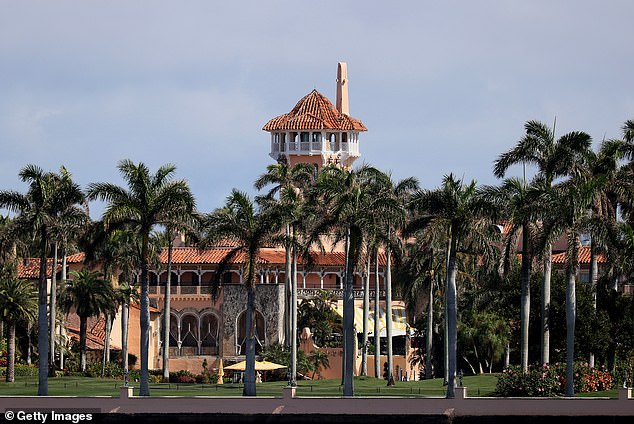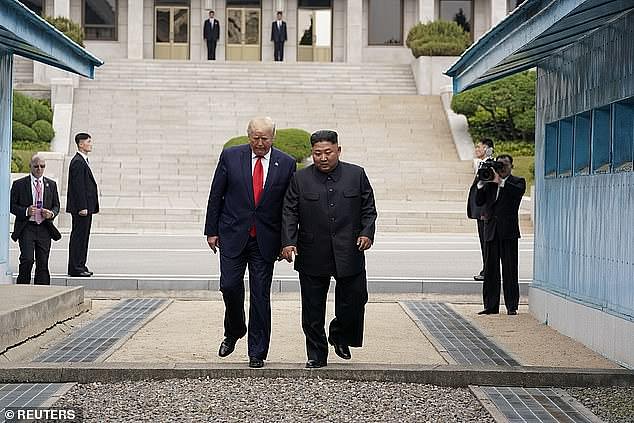More On: The National Archives
The National Archives seized Trump's White House documents from Mar-a-Lago, including his 'love letters' from Kim Jong Un and Obama's Oval Office note
The National Archives was compelled to reclaim boxes of official White House materials from former President Donald Trump's Mar-a-Lago estate in Florida, including letters from North Korean leader Kim Jong Un, that had been wrongfully removed by the ex-president.
The records and presents, which were supposed to be given over to The National Archives and Records Administration at the conclusion of Trump's administration, were seized by the agency last month, three people familiar with the visit told the Washington Post.
Trump and his crew allegedly stole the records because they were not adhering to document preservation regulations.
Memos, notes, letters, emails, faxes, and other written communication relevant to the president's official responsibilities must be turned over to the National Archives for preservation under the Presidential Records Act.
The recovery of official White House materials from Trump's Florida resort raises concerns about his compliance with the Act.
According to one former Trump assistant, the ex-president did not act with criminal intent, and the boxes of documents included letters from international leaders as well as presents and memories.
'I don't believe he did it maliciously to evade compliance with the Presidential Records Act,' the source told the Post.
'He's been highly transactional for as long as he's been in business, and that was probably his lengthy practice, and I don't believe his behaviors altered when he came to the White House.'


According to two people familiar with the contents of the boxes, the boxes of official White House papers discovered at Trump's home included letters from North Korean leader Kim Jong Un and President Barack Obama.
Trump previously said that after meeting in person, he and Kim "fell in love." Some refer to the exchanges between the US president and North Korea's leadership as "love letters."
While the law requires presidents to save documents relating to administration activities, the National Archives has little authority to enforce this. According to one Archives employee, the Act acts more like a 'gentlemen's agreement.'
Trump failed last month in his attempt to prevent the publication of presidential papers from the National Archives to the House select committee investigating the January 6, 2021 Capitol riot.
The records were sent to the House subcommittee in January 2022.
The Supreme Court had ordered that the archives may send over the records, which included presidential diaries, visitor logs, speech drafts, and handwritten notes from former chief of staff Mark Meadows' files relating to Jan. 6.
Trump's attorneys intended to prolong the legal battle and keep the records on hold.
The records, which the panel sought in August, will be added to the tens of thousands already obtained as the committee probes the assault by a violent mob of Trump fans and what the former president and his advisers were doing while it was taking place.
'The only way that a president can truly be held accountable long term is to keep a record of who said what, who did what, what policies were encouraged or adopted, and that is such an important part of the long-term scope of accountability — beyond just elections and campaigns,' presidential historian Lindsay Chervinsky told the Washington Post.
Chervinksy went on to say that not disclosing information and papers would jeopardize US national security. 'That might be a significant issue if the future government is flying blind without that knowledge,' she says.
Representative Stephanie Murphy (D-FL), a member of the House subcommittee on January 6, said that the entire records problem represented the "unconventional character of how this White House worked." She also said that she was unaware of the transfer of papers from Trump's Mar-a-Lago home.
'It's hardly surprising that they didn't follow the guidelines,' Murphy added. 'In terms of how this development pertains to the committee's work, we have several sources and means for collecting the papers and information that we want.'
While previous administrations have broken the Presidential Information Act in some fashion, insiders told the newspaper that Trump's administration is unique because of the scope of the records seized from Mar-a-Lago.
Someone described it as "out of the norm." The National Archives and Records Administration has never experienced a volume transfer like this after the fact.'

A lawyer who worked in President Obama's White House Counsel's Office questioned why it took a year for the boxes to get to the archives.
'Things that are national security critical or very plainly government records should have been part of a first sweep,' the lawyer said, adding that the fact that it has taken this long does not reflect well on Trump. 'How come it took a year for these crates to arrive?' 'Are there any more boxes?'
The National Archives acknowledged in a statement that some of the documents given over to the select committee were taped together by personnel because they had been torn up.
'Some of the Trump presidential documents received by the National Archives and Records Administration contained paper papers ripped up by former President Trump,' the Archives informed CNN, without explaining how it was determined that Trump was the one who defiled the records.
'These were given over to the National Archives at the conclusion of the Trump Administration, along with a number of torn-up documents that the White House had not restored,' the Archives stated.
'The Presidential Documents Act compels presidents to turn over all records generated during their administrations to the National Archives at the conclusion of their terms.'
The Archives has grappled with Trump's lack of document retention and propensity of tearing papers when he was through with them.
Because the former president routinely ripped up official papers, hundreds of pages that arrived to the Archives had to be glued back together, while others arrived in fragments.
Former House counsel Charles Tiefer said that if there is a 'willful and criminal purpose' to violate the Act by hiding or destroying public information, they might face up to three years in jail.
'You can't charge someone for just ripping up paperwork,' he added. 'You'd have to demonstrate him being really discriminating and have proof that he intended to engage in illegal behavior.'













